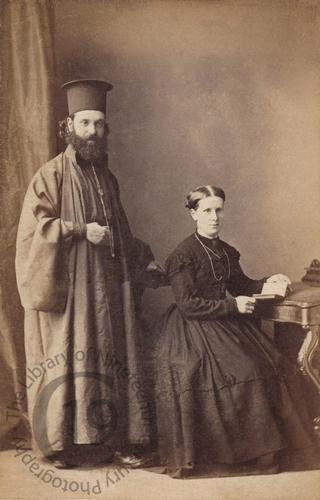
Reverend Stephen Hatherly
A carte-de-visite portrait of Stephen Hatherly, who achieved some notoriety as the first Englishman to become an Orthodox priest. He is seen here with his wife Hannah (née Bagott).
Born Stephen George Hatherly in Bristol in 1827, he was the third son of George Harvey Hatherly, a commercial traveller in the tea trade, and his wife Sarah. In 1848 in Birmingham Stephen married Hannah Bagott, who was born in Darlaston in Staffordshire in or about 1829. The marriage produced at least four sons and two daughters.
At the time of the 1851 census, the couple were living in Solihull. Stephen gave ‘Organist and Teacher of Music’ as his profession. Ten years later he described himself as a ‘Musical Author and Teacher.’ In 1856 he graduated as a Bachelor of Music from New College, Oxford. That same year he was baptised into the Orthodox Church by a Greek priest, Narcissus Morphinos.
According to his own account, his interest in Orthodoxy was first aroused when, while still only a child, he read ‘in a class-book a description of […] its history, its doctrines, its discipline, &c.’ When he went a step further and decided not only to become a priest of his adopted religion but to found an Orthodox congregation in Wolverhampton, this caused some agitation amongst his countrymen. Various reports of his plans appeared in the British press, most of them tinged with a note of Protestant hysteria. To quote only one example, a correspondent for the Pall Mall Gazette (12 August 1869) thought that: ‘Some serious danger appears to threaten the Established Church from a rather unexpected quarter; and if we have no power to prevent this danger, we can at any rate point it out. The threatening quarter is Wolverhampton, near Birmingham, and the threatening persons are twenty-one Englishmen under the leadership of Mr Stephen Hatherly, self-appointed high-priest of the Orthodox Russian Church in England.’ The article quotes at length from Hatherly’s own account of his early life and his future intentions that had recently been published in a Russian newspaper, the Moscow Gazette: ‘In visiting Russia my aim was to obtain a grant from Holy Synod, and the support of true Christians, for the establishment of an orthodox temple in one of the central industrial cities of England – in Wolverhampton, near Birmingham; where I should be able to preach and teach to my countrymen the Divine truths recognized by our Holy Orthodox Church. […] The parish for the proposed temple may be said to exist already, as the petition presented to the Holy Synod is signed by twenty-one persons, and all of them have promised their zealous support. […] If we remember that Christianity itself was once limited to twelve men, we must not despair of the efforts of twenty.’ To this last observation the Pall Mall Gazette sarcastically replied: ‘In short, the energy, as well as the modesty, of Mr Stephen Hatherly is most praiseworthy.’
Two years later the same journal informed its readers that: ‘The Levant papers report that the Rev. Stephen Hatherly, whose admission by the Greek Patriarch to Deacon’s orders, and subsequent appointment to the pastorate of the new Anglo-Greek Church at Wolverhampton, caused some stir last year, received priest’s orders on Sunday, the 8th inst., at the hands of the Metropolitan of Anchialos, in the church attached to the Greek Theological Seminary of the Holy Trinity at Halki. The incident had the effect of attracting a large crowd of worshippers, the greater portion of them being English-speaking members of the Greek community’ (The Pall Mall Gazette, 24 October 1871).
When the 1881 census was taken, Stephen and Hannah were living at Stapleton, a suburb of Bristol in Gloucestershire, Stephen described himself as ‘Mus[ic] Bach. Oxon. / Archpriest of the Greek Church /Serving Sailors on Ship Board.’ On later censuses, when the family were living at Liscard in Cheshire, he described himself simply as an ‘Archpriest of the Greek Church.’
The Reverend Stephen Hatherly died aged 78 on 2 November 1905 at 26 Sedgley Road in Winton, a suburb of Bournemouth, then in the county of Hampshire. He left personal effects valued at £172. Hannah died in 1909. Her death was registered in the same district, Christchurch in Hampshire.
Photographed by Mrs Williams of Wolverhampton.
The reverse of the mount carries the clipped autographs of both sitters.
Code: 126747




